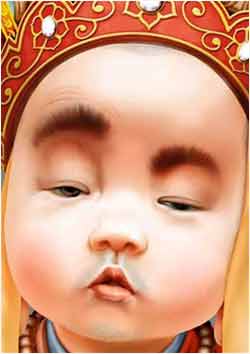Fictional & Classical Chinese Women From The Red Chamber
千红一哭, 万艳同悲. Under my impression, the order should be in - 薛宝钗(when get married but hears about the bad news of 贾母)、尤二娘(as the concubine of 贾琏)、贾迎春(the first one)、鸳鸯(when harassed by 贾赦)、薛宝钗(when talking to 贾宝玉)、尤三娘(commits suicide for 柳湘莲)、邢岫烟、贾迎春(the second one)、巧儿(when she meets 刘姥姥 after the confiscation)、晴雯(gets 贾宝玉 to visit her before she dies)、王熙凤(could be the time she manages 宁国府)、林黛玉(dying1)、芳官?藕官?龄官?、林黛玉(dying2)、林黛玉(dying3)、薛宝钗、晴雯(tearing the fan)、史湘云(festival of lanterns?)、林黛玉(when reading 西厢记 with 贾宝玉)、林黛玉(when she could not find 贾宝玉)、秦可卿(when looking after 贾宝玉)、薛宝钗(after the marriage with 贾宝玉?)、司棋(commits suicide for 潘又安)、尤氏(at the funeral of 秦可卿)、王熙凤(could be angry at 贾琏)、贾探春(when hears about her marriage to a king)、薛宝钗(when 贾宝玉 leaves to be a monk)、金钏(the image in 贾宝玉's mind when he prays for her)、小红(when peeking 贾芸)、尤二娘(when devours the nuggets to kill herself)、紫鹃(after the well-meaning test for 贾宝玉)、贾元春(when comes back to 省亲别墅)、贾探春(could be the time when 林黛玉 steps into 荣国府)、玉钏(after the death of 金钏)、晴雯(in 贾宝玉's memory)、司棋(before her death)、芳官?藕官?龄官?、袭人(when hears about that 贾宝玉 collapses after the trick of 紫鹃)、薛宝钗(when 贾宝玉 doesn't listen to her words to study more)、司棋(when she makes trouble in the kitchen?)、晴雯(chewing out other servants)、平儿、???(the actress who looks like 林黛玉)、香菱、邢岫烟&薛宝钗、晴雯(in 贾宝玉's memory2)、晴雯(when 王夫人 evicts her out of 大观园)、贾元春(reunion with her family when 省亲 as the Imperial Concubine)、尤二娘(persecuted by 王熙凤&秋桐)、贾母(when 贾敬 dies)、贾探春(leaves her family forever due to coercive marriage)、林黛玉(after the altercation with 贾宝玉 who throws the jade)、林黛玉(dying4)、妙玉(tastes tea with 林黛玉?)、 史湘云(sleeps among the peony when gets drunk)。。。
Well, they are from the novel "Dream of the Red Chamber", by general consensus regarded as the zenith of classical Chinese fiction, probably the best written fiction in human history. And the unfinished chapters by its original author Cao Xueqin that was allegedly completed by Gao E using Cao's manuscript further mystified its readers about how Cao Xueqin would have composed it had he not died. However, not everybody, including most impatient Chinese nowadays and almost all the foreigners who don't know the Chinese language and have no idea of Chinese culture, can well understand the novel, that is, its mysterious opening prophecy, the silhouetted philosophy, its social base and Chinese feudalistic tradition, the intricate poetry all around the text, the psychological details of thousands of characters, and even the complicated family tree structure of the four families and clans, etc, just like what the prefaced poem writes - "都云作者痴, 谁解其中味". I must admit that I never once read through the normal 120-chapter version word by word as I know even if I did I would never grasp the author's true meaning, especially in those poem parts. I've only read some important chapters and browsed through the rest, and many other articles and books written by those Redologists. If you ask me about the basic Honglou mini stories I would probably know all of them, but if you ask me to discriminate the opinions among the whole spectrum of sayings about a certain respect of the novel, I would feel incapable to do that...












































0 Comments:
Post a Comment
<< Home